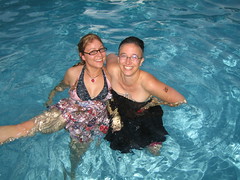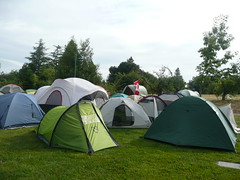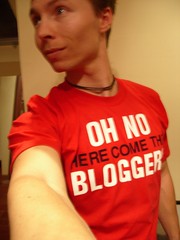The Internet Drama in Feminist Discourse panel was led by Rachel (RMJ) from Deeply Problematic and Garland Grey from Tiger Beatdown.

My notes are fairly sketchy. Many people in the room spoke up but I didn’t record everything and wasn’t sure of people’s names. The hashtag on Twitter was #femdrama, and from that tag I can see Natalia, caitlinrain, kaisersake, queenie_nyc, lzbellz. We went back and forth lot between talking about trolling or moderating obvious crap, vs. engaging in discourse between blogs as well as among commenters.
I talked a bunch in the middle of this panel, but forgot to mention that there is quite a lot about this topic and the idea of feminist “safe space” vs. Anonymous free speech in a book in 2009, The WisCon Chronicles: Carnival of Feminist SF. Section 3 of the book is all about Internet Drama, with contributions from Micole Sudberg, Cynthia Gonsalves, JJ Pionke, Hanne Blank, Vito Excalibur, my transcript of a panel called Can Internet Drama Change the World? with panelists Alexis Lothian, K. Tempest Bradford, Woodrow Hill, Julia Starkey, and K. Joyce Tsai. Debbie Notkin and I wrote a long essay about feminist culture class here, “Safe Space vs. LOLspace in the WisCon Trolling”. I think the participants push hard on the boundaries of what we expect from public discourse.
To start off the discussion, Rachel and Garland introduced themselves and mentioned their blogs and their experiences being suddenly embroiled in very intense and sometimes personal discussions online.
Rachel says drama can be useful and it can be possible to create drama for good or at least use it for good. Why would you start drama? What do we mean by it? How do you deal with people starting drama with you, in a responsible and ethical manner? How do you internally deal with the stress of it and take care of yourself while continuing on with your feminist activism?
Garland mentioned hashtag activism, like Tiger Beatdown’s #mooreandme campaign. He hopes we don’t start any new drama in this room today. If we mention recent feminist discourse online, great, but let’s not take sides on particular incidents. Rachel asks for our personal backgrounds or experience in this area.
A guy with big glasses talks a bit about a rock and roll bulletin board or mailing list he’s involved with and says drama arises over people deciding other people should be banned. Drama is splitting, divisive, and means people have to go off and make new forums.
Rachel responds that that’s how new communities formed. In answer to Rachel’s question about what drama means, I talked a bit about how the personal is political, we try to put feminisms into practice in daily life, we examine that in public discourse and it gets very intense.
Rachel talked about how criticism can be very personal and come in a barrage. It can carry the overwhelming message that we already get from society that our voices are worthless, it’s not worth continuing to put it out there. We have to separate the criticism we get that’s valid from that overwhelming societal message that we’re supposed to shut up.
Natalia talked about female leadership and the leaky pipeline. She was at a talk where Ruth Simmons was speaking; she was drained from being the token person speaking up, and Ruth said something about it being important for us to keep speaking up, because people who see us staying silent then think they’re not part of things either.
Garland talked about hostile actors, people who want to shut a conversation down or aren’t acting in good faith. Some people come in and are obvious name callers but it can also be stealthy, injecting ideas into a conversation that disintegrate it, undermine discourse, for example, the idea that “it’s just the the internet” and isn’t important. For instance Penny Arcade… (a bunch of people in the room laugh in response and talk about the dickwolves thing).
People talked about trolls and moderation and getting overwhelmed with comments. I mentioned geekfeminism.org and our comment policy. We also have filters for sensitive topics that bump comments right into moderation, like “too sensitive”.
The guy with glasses talked more about the women in Phish fandom board he’s part of. It was something like 90% women and 10% men. They started a women only forum. So excluding men was one option for improving the drama.
Teresa Van Deusen said it’s really bad when things immediately devolve into name calling. Someone talked about drama at SXSWi this year and how people in one context don’t think you might have other identities in the room. There is some poster about liking boobies and people don’t think about what that says. You can be a woman who likes women, and likes boobs, but still hates the ad and thinks it’s sexist.
Rachel talked about how drama is a really good way for some people to talk about intersectionality. People learn what language to use, how to quote people, how not to appropriate people’s words. At best it’s not a destructive cycle of anxiety where there’s drama. Someone else then talked about Amanda Marcotte whose work they admire, but she had given a speech that was appropriating things women of color had said, and then her response wasn’t good. We then talked about women of color and feminists of color being marginalized. Rachel mentioned that has plagued feminism since at least the 1800s, racism in feminism isn’t new with the Internet. Garland adds that we can screw up a lot faster now. There was some mention of intersectionality and privilege, cisgender, class, race, US-centrism, and other oppressions we fight as women.
Garland asked us to consider what we want from this discussion. What would make our day? Teresa responds that she already thinks the last 7 years or so of feminist discourse online has been amazing and beautiful.
Someone from Bitch Magazine says that when you’re feminist and blogging and unpaid and then get embroiled in drama it’s just difficult. There was more discussion of trolling, moderation, and swift banning. Rachel said that disallowing anonymous comments has been helpful for her to manage time. On her main blog she doesn’t get a ton of comments but when she writes for a bigger site the responses can be really bad. Emily May from Hollaback says at first they didn’t allow comments at all. Now they do. Michael from a small women’s college in Minnesota then talked about their online communities and I think Facebook, but my notes are incomplete.
Natalia talked about hashable and how mainstreaming feminist discourse can be important. She loves hashable and wanted to give constructive criticism of it.Their automated greeting is “Hi guys” which she criticised with the #languagematters tag. They responded fairly well, and then said “Well, it’s mostly not sexist”. Then they listened and changed the greeting to “hi there”. Rachel talked about discouraging and disallowing ablist language. Teresa said we need an app for that. The room buzzed a little about editing filters that would help alert us not to make common mistakes. It might be nice to have a WordPress plugin.
I talked some about how public discourse is documenting our consciousness raising. The riot grrrl movement isn’t well documented on the web. Maybe the web is going to make our history more obvious and accessible. Criticising other feminists is especially fraught because we are all vulnerable to the tools of misogyny, which can take us all down. Once the criticisms go mainstream, we all look bad, we’re catfighting, etc, but we have to do it and treat it as an important part of history. Very young girls are reading this stuff now, they get our history early, they are prepared. When I saw Style Rookie commenting around the feminist blogosphere it was great.
The band fan guy talked more but I did not get what he was trying to say. I totally wondered what his drama was though because he clearly had had at least one.
Someone else said please learn from feminism from past dramas. If criticized then think about it, think critically, don’t keep making the same mistake over and over, learn how to apologize, edit your posts.
Natalia: Women of color’s voices are silenced, people don’t htink about that by generalizing about this to be about white women, they’re not thinking of women of color. When we say how can we call people out in a constructive way, actually, what we need is not so much that as we need white people not to freak out when called out on their wording or on not including women of color.
There was a general “hear hear” throughout the room and a bunch of different women spoke up to say they agree.
I said some things about the tone argument and that anger isn’t a reason not to listen to someone and their point.
Someone else talked about giving way more validation and consideration to a harsh criticism when it came from a particular identity. Skye talked about that too but I missed the particular example. Garland says he can be rude and confrontational and that’s his personal style; if he feels like someone made a mistake and didn’t do it maliciously, he can be nicer, but intentions don’t matter in some ways.
An organizer from Girls Rock talked about watching teenage girls get harassed by boys, like on Facebook boys just going “girls suck” and the girls having to deal with that. How to help them in public spaces?
Rachel says, Think on how you will want to respond. What kinds of spaces are you creating? What do they have room for? What volume will there be?
People talk about when to stop engaging. What to do when people are asking over and over to be educated and you have to do feminism and racism 101 constantly. Dealing with derailing.
I said that we keep talking about intersectionality as our hotspot of feminist discourse rather than there being drama about any particular political position like abortion. As feminists talking in public we have to have a deflector shield of not listening to people telling us not to do it. Then it is all too easy misapply that shield to other feminists and allies and their critiques. We need not to dismiss criticism because it’s angry and there is a place for anger in public discourse between women and resolving it and working through it and anger doesn’t have to mean failure.
Someone talked about some Susan Faludi articles but I couldn’t hear…
Skye from Heroine Content talked about a post and comments from women of color about them being racist in their coverage of this action movie with jodie foster with a gun. She has a double standard of letting those comment through because she wants to hear those criticisms and also make them clear that they’re happening and what her response will be. (Rather than deleting a comment for being angry.) Rachel agrees and thinks it says it very well.
Someone else said we are not doing the oppression olympics with comparisons but feminism can lead people into anti racism.
Rachel says she feels it’s important to take criticism seriously when someone marginalized criticizes her privilege she looks at it straight away.
People talk about self care and it being stressful to be the person giving the criticisms . And it is important to take breaks, short or long, and look away, helpful to get away from situations for a while. Be with your friends.
Natalia talked about being uncomfortable with the analogy of stains on your record. We are human, it’s not a stain, it makes us more us, we all make mistakes and are growing.
Rachel: It’s still a mark, just because I messed up and now have grown, it doesn’t mean people have to start liking me again.
Natalia talks about the movie Switch and how she liked it a lot, then realized from online discussions that it was about violation and rape, and she felt like a bad feminist for liking the movie. She then held that self anger and disappointment, thought, let’s be with that, and how am I going to change and are we going to change? How can we become better? And not be reductive?
There was more discussion, but I don’t have the notes. The discussion successfully raised a lot of important points for people to think about, and I think established that many people in the room felt that drama, or at least heated discussion between feminists online, is important. There was some dwelling on how to react internally and in public as a person with privilege who is going to get criticized in public but also some good mention of the personal and political impact it takes on marginalized people to have to do the criticism so it was not all “tra la la learning experience”. I do think this discussion was harder to have in the environment of SXSWi than in a smaller and more feminism-focused conference, or at least harder to dive into the conversation intensely, in part because we didn’t know each other or who we were talking with other than the panelists. I would have wished for a brief introductions round for everyone in the room, but it was only a 1 hour panel so perhaps too short for that. I also would have gone for a bigger panel with more diversity among panelists. It made me really happy to get to hang out with Other Feminists on the Internet but in person!! I’m so glad we had this complicated conversation at SXSW and think it needs to keep happening. Thanks to Rachel, Garland, and all the other people in the room for showing up and kicking ass and taking inspiration from each other.
I feel I should point to existing discussions about feminism and online discourse but will need to do that in another post or later in a comment below. If anyone has suggestions or would like to point to a post round-up that already exists, please comment and link-drop!






